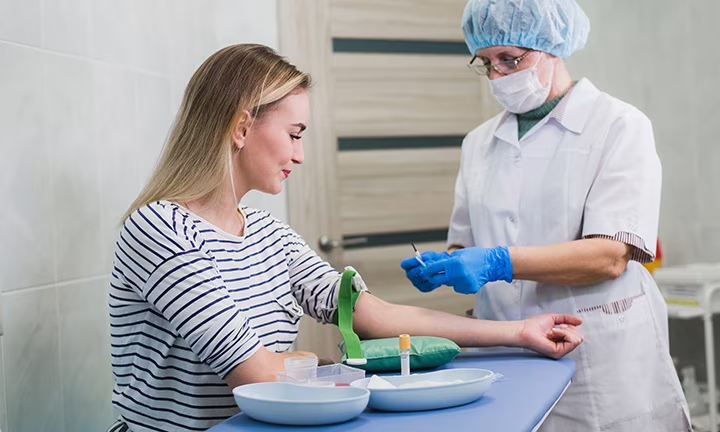
Glucose Challenge and Tolerance Tests in Pregnancy
During pregnancy, your healthcare provider may recommend a glucose test to check for gestational diabetes, a temporary form of diabetes that can affect you and your baby’s health. There are two types of tests: The glucose challenge test (1-hour test) which is usually a standard pregnancy screening, and the glucose tolerance test (3-hour test) which is a diagnostic test done if the first test shows high blood sugar levels.
Key Things to Know:
Understanding your glucose test results helps you and your healthcare provider take steps to keep you and your baby healthy. Keep reading for a detailed guide on each test, what to expect, and how to prepare.
What Is a Glucose Screening Test in Pregnancy?
Two glucose tests are typically offered during pregnancy as part of your prenatal care. Both the glucose challenge test (the most common glucose screening test) and the glucose tolerance test measure how your body responds to glucose (sugar) and help determine if you have gestational diabetes, which may develop during your pregnancy.
These glucose tests are routinely done during pregnancy and are recommended by the American College of Obstetricians and Gynecologists (ACOG) for all pregnant people.
Glucose Challenge Test in Pregnancy
The glucose challenge test, also known as glucose screening or 1-hour glucose challenge test, is a routine screening for gestational diabetes, usually performed between 24 and 28 weeks of pregnancy. It involves drinking a glucose drink (a sugary solution), followed by a blood test to measure blood sugar levels in pregnancy. If results are higher than normal, further testing is needed to confirm gestational diabetes.
Oral Glucose Tolerance Test in Pregnancy
The oral glucose tolerance test, also known as the 3-hour glucose test, is a diagnostic test used to confirm gestational diabetes if the glucose challenge test results are elevated. It involves fasting, drinking a glucose solution, and multiple blood draws over a few hours to assess how the body processes sugar.
We’ll cover more about how these tests are performed in our section below: How Does a Glucose Test in Pregnancy Work.
Pregnancy Weight Gain Calculator
Fill out your details:
When Do You Take the Glucose Tests During Your Pregnancy?
The glucose challenge test is usually performed between 24 and 28 weeks of pregnancy in people who are determined by their healthcare providers to be at low risk of gestational diabetes.
If your healthcare provider has determined that you are at high risk of developing gestational diabetes, the provider may order the glucose challenge test for you earlier than the aforementioned range.
If the result of the glucose challenge test comes back indicating a high level of glucose, your provider may order a glucose tolerance test to more accurately diagnose your chance of developing gestational diabetes in pregnancy.
If the result of an early glucose challenge test (for high-risk pregnant individuals) comes back indicating a normal level of glucose in your blood, your provider may order an additional glucose challenge test between 24 and 28 weeks of pregnancy.
In Summary
If you’re a low-risk candidate for gestational diabetes, your healthcare provider may order a glucose challenge test for you between 24 and 28 weeks of pregnancy. If you're at high risk, the test may be done earlier. If the results of the glucose challenge test come back higher than normal, your provider may order a glucose tolerance test to more accurately diagnose you.
How Does a Glucose Test in Pregnancy Work?
As mentioned earlier, first, you'll have a glucose challenge test. This involves a one-hour procedure that begins with you drinking a sugary solution (typically 5 ounces of water with 50 grams of sugar). An hour later, a blood sample is taken and tested to measure your blood sugar level.
If the blood test results of that test show high levels of blood sugar, your healthcare provider may order a second test, the glucose tolerance test.
This second, more complex test is a three-hour procedure that begins with a blood sample being drawn. Next, you drink a concentrated sugary solution (8 ounces of water with 100 grams of sugar). Then, your blood is drawn three more times. In total, four blood samples will be taken.
Don’t worry if this seems a lot to remember, your healthcare provider will give you the glucose test instructions and guide you through step-by-step.
What Makes You a High- or Low-Risk Candidate for Gestational Diabetes?
If you’re at high risk for gestational diabetes (sometimes initially suspected after a high glucose level is detected in your urine during a previous prenatal visit), your healthcare provider may also consider certain aspects of your medical history.
The provider may take into account your pre-pregnancy weight (whether you were overweight or obese), your age, whether anyone in your family has had gestational diabetes or diabetes, your race or ethnic background (as certain populations are at higher risk), and outcomes of any previous pregnancies.
Speak to your healthcare provider to find out whether you have a high risk or low risk of developing gestational diabetes. If the provider determines your risk is low, you may not have to take the glucose challenge test.
How to Prepare for the Pregnancy Glucose Tests? How Long to Fast and What to Eat
Some common questions before taking a pregnancy glucose test include, “How long to fast before the glucose test?” and “What to eat for breakfast before the pregnancy glucose test?” In preparation for either of the glucose tests, you can usually continue to eat normally in the days leading up to the test. There’s no specific prep you need to do or any reason for you to change your diet. However, the glucose tolerance test does require you to fast beforehand. If you’re taking any medications, let your healthcare provider know in advance as some medications may affect test results.
Prep Before the Glucose Challenge Test
You don’t have to worry about what you can or cannot eat and drink before taking a glucose challenge test, because it’s a non-fasting, one-hour procedure that tests your blood sugar levels in pregnancy.
Prep Before the Glucose Tolerance Test
If your provider has scheduled a glucose tolerance test during your pregnancy, you will be given fasting instructions. This means you probably won’t be able to eat or drink anything except for small sips of water for about 8 to 14 hours before the test.
You may find it convenient to schedule a morning appointment for the glucose tolerance test so that you can fast overnight. You will need to stay at the lab or clinic for the full procedure, so you might consider bringing something to read or do or having your phone fully charged so that you can occupy yourself during that time.
In Summary
No specific preparation is needed for the glucose challenge test; you can eat normally. For the glucose tolerance test, fasting for 8 to 14 hours is usually required. It's best to schedule this test in the morning to make fasting easier. Inform your provider about any medications you’re taking, as they may affect the results.
Glucose Test Results: Did You Pass Your Glucose Pregnancy Test?
The normal range for blood sugar levels during pregnancy, as determined by the glucose challenge test (one-hour procedure) and the glucose tolerance test (three-hour procedure), can vary by lab or clinic. Therefore, your healthcare provider is the best resource for information regarding your specific results and the recommended next steps for your pregnancy. However, these general guidelines may apply:
Glucose Challenge Test (1-Hour Glucose Test) Results
Many medical experts consider a normal result for a glucose challenge test to be a blood sugar level of 140 mg/dL (7.8 mmol/L) or lower. The term mg/dL stands for milligrams per deciliter, while mmol/L represents millimoles per liter. These units are used to measure glucose levels in your blood sample. A normal result indicates that you do not have gestational diabetes.
If your glucose levels are higher than 140 mg/dL (7.8 mmol/L), your healthcare provider may recommend you do the glucose tolerance test, which can help better determine if you have gestational diabetes or not.
Glucose Tolerance Test (3-Hour Glucose Test) Results
What do the results of the glucose tolerance test indicate? Four blood samples are drawn during a glucose tolerance test. If just one of the four results is higher than normal, your provider may recommend that you make subtle changes to your current pregnancy diet. The provider may have you take another glucose tolerance test after you’ve made those changes to check if the results have improved.
If more than one of the results for the 3-hour glucose test has higher levels than normal, your provider may determine that you have gestational diabetes. The following chart shows the normal glucose level and high glucose level results for the 3-hour glucose test:
If your glucose levels are high and it’s determined that you have gestational diabetes, your healthcare provider can help guide you in making changes to help manage it. Read more below about what happens if you fail your glucose tolerance test during pregnancy.
What Happens If You Fail Your Glucose Pregnancy Test?
If your glucose challenge test result is higher than normal, it doesn’t automatically mean you have gestational diabetes. As mentioned above, your healthcare provider will likely recommend a follow-up oral glucose tolerance test (3-hour glucose tolerance test), which involves fasting and multiple blood tests to measure how your body processes sugar over time.
If your glucose challenge test confirms gestational diabetes, your healthcare provider will work with you to keep your blood sugar levels within a healthy range. This is important to reduce risks like high birth weight, early delivery, or low blood sugar in your baby after birth.
Here’s what your care plan might include:
Most cases of gestational diabetes can be managed well with these steps, and blood sugar levels typically return to normal after delivery. However, having gestational diabetes increases the risk of developing type 2 diabetes later in life, so follow-up testing after pregnancy is recommended.
FAQS AT A GLANCE
Yes, you can refuse the glucose test, but it’s an important screening for gestational diabetes, which can affect both you and your baby’s health. If you have concerns, talk to your healthcare provider about alternatives, such as monitoring blood sugar at home or dietary-controlled testing.
The Bottom Line
The glucose challenge test, or 1-hour glucose test, is a routine procedure that’s recommended by medical experts during your pregnancy. It’s used to measure the glucose levels in your blood and make sure that they’re normal. If by chance the results are determined to be high, your provider may recommend an additional test called the glucose tolerance test, or 3-hour glucose test.
The purpose of the glucose tolerance test is to better determine if you are at risk of developing gestational diabetes. This test is slightly more complex than the glucose challenge test, and you will have to fast beforehand.
With the results of the glucose tolerance test in hand, your healthcare provider will be better able to diagnose you. If it’s determined you have gestational diabetes, know that it’s a manageable condition. Your provider can help you manage it by recommending a healthier diet, exercise, and possibly even medication.
For some helpful information, take a look at our guides: Nutrition During Pregnancy and Exercising While Pregnant. Check with your healthcare provider before starting any exercise program during your pregnancy.
Don’t feel intimidated by these tests or what the results mean. The tests are important tools for ensuring you and your baby are healthy throughout your pregnancy. If you’re in any doubt about these tests and what your results mean, your provider will be able to give you all the information you need.
Once your little one arrives, you’ll need plenty of wipes and diapers! Download the Pampers Rewards App today to get rewards and discounts on all your future purchases and make parenting life just that little bit easier.
- American College of Obstetricians and Gynecologists. Your Pregnancy and Childbirth: Month to Month, 6th ed. (Washington, DC: American College of Obstetricians and Gynecologists, 2015).
- Mayo Clinic. Guide to a Healthy Pregnancy, 2nd ed. (Rochester, MN: Mayo Clinic Press, 2018).
- Cleveland Clinic. “Oral Glucose Tolerance Test During Pregnancy.”
- Kids Health. “Prenatal Test: Glucose Screening.”
- Mayo Clinic. “Glucose Challenge Test.”
- Mayo Clinic. “Glucose Tolerance Test.”
- Mayo Clinic. “Gestational Diabetes.”
Read more about Pregnancy
Join a World of Support
through Pregnancy and Parenthood.
TRACK WITH TOOLS
LEARN WITH EXPERTS
GET REWARDED












